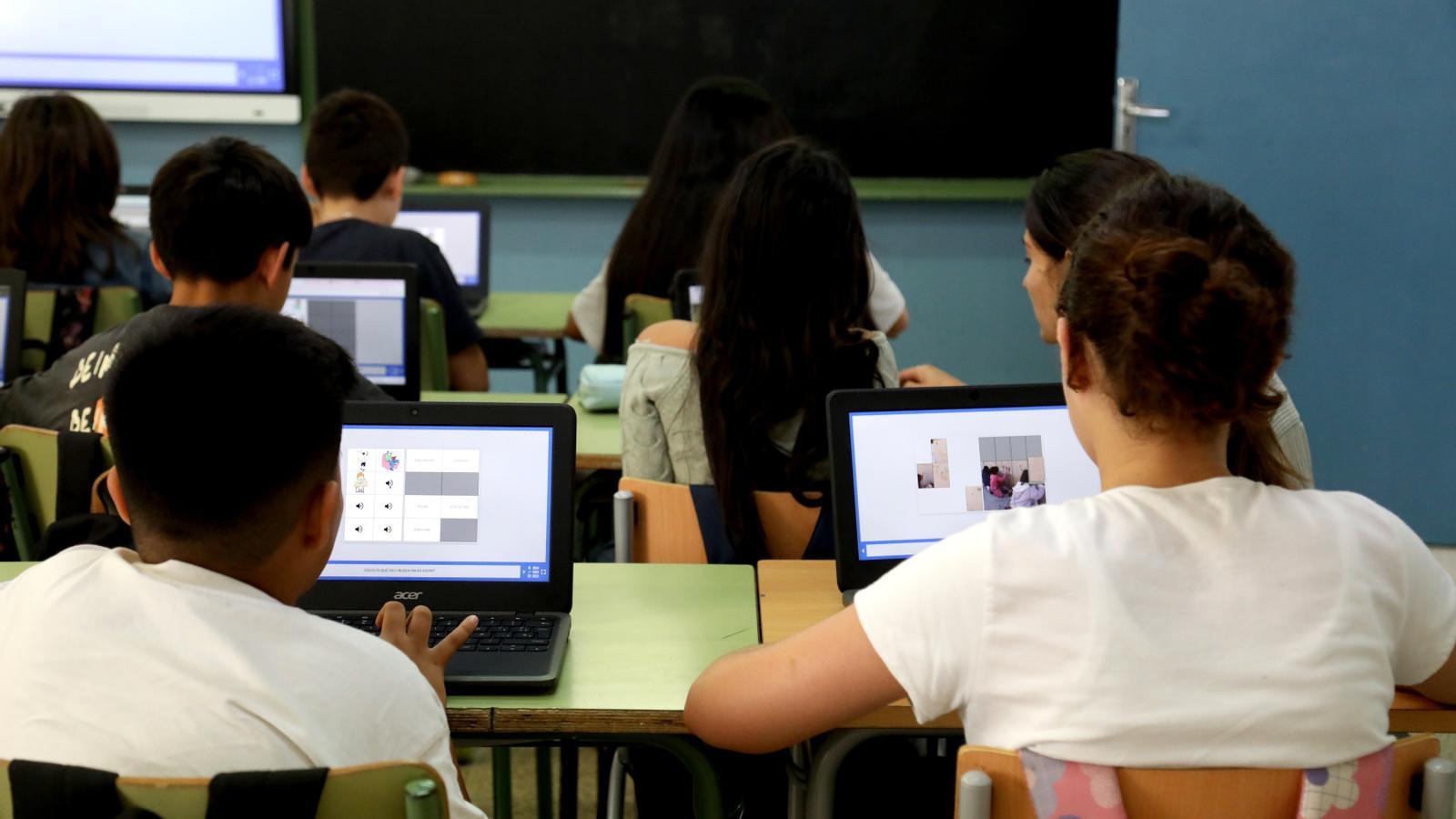The school year of "no" on screens: "It's reasonable, but not enough"
Educational centers maintain that they make rational use of technology and that they are the main victims of students' misuse of technology, especially outside the classroom.


PalmThe Ministry of Education has banned the use of individual digital screens until third grade of primary school starting this 2025-2026 academic year, limiting their use to one hour per week in fourth grade, and leaving the decision in the hands of schools in fifth and sixth grades. In recent years, schools in the Balearic Islands have incorporated Chromebooks into classrooms, which with the new regulations (if nothing changes) will be practically banned, with a few pedagogical exceptions. Throughout these years, it has been the Ministry itself that has urged schools to train in digitalization and adapt to new methodologies.
What do schools think about the fact that the rules of the game are now being changed again? We spoke with various professionals from the world of education. In most cases, especially in public schools, the impact will be minimal, because screen use is very limited until the fourth grade, while students' use of Chromebooks is more common in the fifth grade. However, this will always be supervised by teachers.
Luna Alacid is the principal of CEIP El Terreno and asserts that teachers are a group that suffers the consequences of technology misuse among children. "We are sufficiently aware of limiting its use, improving our training, and implementing good educational practices. At our school, I can assure you that no teacher overuses it," she states. The various management positions consulted expressed a similar sentiment. Chromebooks typically gain importance in the educational dynamics of the third cycle (fifth and sixth grades). For example, with the Classroom tool: an internal school chat that allows direct contact between teacher and student, both for posting activities and for immediately correcting work and interacting.
Among other platforms, Classroom was the saving grace for education during the pandemic, when internet access was the only way schools had to contact students. "The regulation won't affect us in Preschool or the first cycle. In the second cycle, we only use Chromebooks because we have a math platform that requires the device for at least one session per week," explains Joana Oliver, director of the CEIP de Prácticas (Center for Internships). The same thing happens at El Terreno. The devices are introduced in fifth grade and, in exceptional cases, in lower grades.
It all depends on how they are used.
Teachers and principals believe that technology, when used properly, has been a tool that has enriched the work carried out in schools by facilitating consultation and independent research work for students. For this reason, they criticize the fact that they are often held responsible for the overall misuse of technology and its consequences on the development of students' abilities. Alacid believes that the problem is not caused by its use in schools, but rather is widespread and, therefore, requires more forceful global measures. "The Regional Ministry's proposal is reasonable, but it is not sufficient to address the magnitude of the conflict. I don't believe the solution is to demonize screens, but rather to regulate their use and provide students with tools to use them responsibly and competently, and avoid the overexposure that children currently suffer," Alacid explains.
Specifically, when announcing the measure at a press conference, the Regional Minister of Education, Antoni Vera, stated that, beyond the limitations imposed by the Administration, a social rethinking of children's relationship with screens is necessary. If educational measures are taken but not accompanied by a cross-cutting transformation, it will be difficult to effectively combat children's problems linked to the misuse of devices. "Comparing technology use at school and at home makes no sense. Use is controlled at school, and it's outside of schools where the misuse occurs," asserts Josep Ramon Cerdà, advisor to the Calvià Teachers' Centre (CEP). "What's happening is that the Regional Ministry sees that limiting screens is a popular issue and goes ahead," he adds.
Cerdà believes that Educació is intervening in this way because there is now a conservative public opinion movement "that preaches a return to the traditional, in all aspects." "The use of textbooks, for example, means reversing all the work that had been done to advance, for example, in attention to diversity," he explains. "Teaching is not just about transmitting content," he asserts. On Friday, May 23, the Regional Minister of Education, Antoni Vera, participated in an event at La Riera with Nuno Crato, former Minister of Education and Science of Portugal. The leader came to Mallorca to present his latest book, entitled Apology for the textbook, "a rigorous defense of the pedagogical value of the textbook as a structuring tool for learning, especially during the school years," according to Educació.
Too many changes in a short time
One behavior that bothers schools is that, regardless of who is in charge of the Ministry of Education, they are forced to constantly change methodologies based on criteria that are not always pedagogical. They complain that for years the Ministry has pushed them to introduce screens and devices into classrooms, forced them to undergo training, and invested money to equip them with new technologies. "Now they are considering undoing all this teacher effort and that financial investment suddenly and without time for prior planning. This is the same old problem, it's either black or white, but perhaps it would be better to take an average and make good use of resources," Oliver laments.
As previously mentioned, the use of devices depends greatly on the school, the type of students, and the educational project. At CEIP Cas Saboners, within the framework of the Innovamat project, first through sixth grades use Chromebooks for one hour a week. Fifth and sixth grades have virtually all the books in digital form. "We don't have physical textbooks. Up to third grade, we have a few workbooks; in fourth grade, we have reusable books that are rarely used; and in fifth and sixth grades, next year there will only be one, a textbook," says the principal, Marilena Suau. At this school, the computers used between first and third grades belong to the school. From fourth to sixth grade, each child buys their own. "If they ban them completely, it will affect us a lot," explains Suau.
Without yet knowing how the measures will be implemented or what exceptions the Department of Education will introduce, teachers defend their resilience in facing the constant changes to which they are subjected by the educational authorities. "It's great that they are focusing on digitalization, but they shouldn't add more bureaucratic tasks that have an ideological and political focus," claims Mònica Martín, a teacher at CEIPIESO Pintor Joan Miró, who lists the variety of resources available to educators. "We have many possibilities that go beyond photocopies, screens, and textbooks... The UDL (Universal Design for Learning) perspective has opened up a range of possibilities for diversifying resources, organization, methodologies, strategies, materials, proposals, dynamics..." she explains.
The reality is that the administration, which years ago told them to train in digitalization, is now telling them that digital screens can be harmful and that they must reduce their use for the good of the students. In the meantime, we must keep in mind that, just as the regulation banning cell phones comes when many schools have banned them in their regulations for years, the limitation of screens will be limited to courses in which many schools either do not use them or do so in a very residual way.
